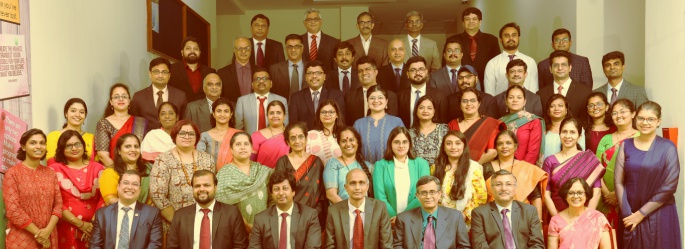Good jobs for B-schoolers are in areas of data and analytics

Publication: Business Line on Campus
Date: 02.09.2021
Pageview: 174,022
Spokesperson: Prof Madhu Veeraraghavan
The Manipal-based TA Pai Management Institute (TAPMI) was quick to adapt to changes when the pandemic broke out last year. The institute, which has accreditation from both AACSB (The Association to Advance Collegiate Schools of Business) and AMBA (Association of MBAs), believes in teamwork, says Prof Madhu Veeraraghavan, Director of TAPMI, in an interview. Excerpts:
How is business education shaping up in the post-Covid world?
Post-Covid, if you look around the world, most B-schools have had to change curriculum for a number of reasons. One is the severe impact of digitalisation. The second major change that has happened is on the leadership side. Now organisations are looking for leaders who are able to handle grave challenges. There is a renewed effort focused on what leadership coverage is happening in B-schools.
The third thing that is happening is the general curriculum. For example, communication, which was there two years ago, has also changed. You are now learning to communicate in a very virtual age. That is a very important aspect. You would not have heard of remote work earlier. Now everybody is talking about remote work. Because of those changes, B-schools have got to be the first ones to implement.
How has TAPMI geared up for the post-Covid scenario?
We, in TAPMI anticipated these challenges early. We changed our curriculum. For instance, everybody has his/her own Coursera licence. Each TAPMIAn has access to 3,200 courses from around the world. They can pick and choose. You have to be very holistic. You have to understand climate change, carbon emissions. Not many B-schools are talking about climate change and carbon emissions. Is that not a risk? Corporations have got to disclose the climate risk in the 10K filings in the US. That is important.
All those sorts of courses we want to bring. It has to be cutting edge. That is the sort of thing we are doing in TAPMI — experiential, bringing in cutting edge courses across areas, looking at new ways to communicate, and innovating the curriculum.
What have you done in the areas of data and analytics, skills industry needs?
Data handling is going to be extremely critical. In the area of analytics, we are ensuring that our students are able to use R, Python, and the advantages of analytics in marketing, HR, and banking and financial services. Because you will be expected to deal with millions of data points. You got to make sense of it. We have a whole major in analytics. We have just set up a new analytics lab, spending almost ₹40-50 lakh.
We have over 200-plus students enrolled in the analytics programme, and this is now going to be the future. If you are looking for good jobs, it is going to be in this space. There is no question about it. We are bringing analytics in all disciplines and areas. It is now all pervasive.
What impact has Covid made on admissions?
We have not seen any drop in applications, but actually the opposite. We have seen a lot more interest. We have been communicating extensively to the aspirant population. This year, we have over 500 students coming to TAPMI. Last year we had the largest batch of 555 students. That is because of the reputation and the legacy that we have, and also because of the engagement we have, and our alumni community.
How closely does TAPMI work with industry to shape and develop its courses?
We have four PGDM (post-graduate diploma in management) programmes at TAPMI – PGDM core, which is the flagship programme, the banking, HR, and the marketing programme. All four programmes are AICTE accredited. The banking programme is completely in alignment with the CFA Society and also the GARP (Global Association of Risk Professionals), which runs the FRM programme. The HR programme is completely in alignment with SHR (Society of Human Resource Management).
The point I am trying to make here is that all of our programmes are totally industry aligned, that is benchmarked to the best industry practices. So that is absolutely critical. In each of the programmes, we have a lot of industry practitioners who come and teach. In the second year, pretty much over 50 per cent of the courses we have are by industry practitioners. They come and talk about how the industry functions. We have over 150 corporate partners with whom we engage. We have an annual fest, guest lectures, competitions where the industry comes and judges; we do a lot of consulting activity as well as executive education. The word we use in TAPMI is corporate engagement — engagement with corporates at multiple levels.
Is TAPMI getting more women candidates and more non-engineers in its courses?
There are two words that are important — diversity and inclusivity. So we are diverse both at the faculty level and at a student level. Almost 37-38 per cent of our students are women, and we will be increasing this. We want to get over 40 per cent women candidates coming to TAPMI. We want many women climbing the corporate ladder. In the US also, less than 6 per cent of the women are heading S&P 500 companies. Not many women have made it to the top of the corporate ladder. So there should be more women coming into MBA schools. That is what we are doing.
And also non-engineers, definitely our focus is to have diversity across branches. Even in engineering you can have diversity. We are already doing a great job. We will continue to work on this.
The most important thing is that TAPMI is part of the United Nations PRME (principles for responsible management education). There is an SDG called SDG 4, which talks about sustainable development by promoting quality education. So we work very closely with the UN PRME in ensuring that inclusive and quality education is happening for TAPMIAns. As a business school I want every TAPMIAn to be aware of the community in which they live, the community in which they will work. They must contribute to the community. Community building is very important for an MBA, particularly for a leader.
The Pro Chancellor of Manipal Academy of Higher Education (MAHE) had recently mentioned that TAPMI will be granting MBA degrees after it becomes part of MAHE from the next academic year. What plans are in store for the institution?
Today there are 21 IIMs, and 18 of them are giving away MBAs. The NEP (National Education Policy) has also said stand-alone institutions cannot now give a PGDM for any more than five years. As a stand-alone institution, we were conferring a PGDM. The NEP says B-schools must be part of a university. Not right now but within five years it should become part of university. We have actually made that step even earlier than what the NEP has said.
As you know, in India, I don’t think, simple PGDM-granting institutions can actually exist because you have to be affiliated to a university. So we are doing that. We can’t be different from what MAHE is doing. For example: TAPMI is an AACSB school, which means we are a mission-driven school.
Our mission will now have to be aligned to the vision of MAHE. This idea of a business school working in a university is not something very new. Harvard, Stanford, Oxford, everywhere business schools are part of universities. MAHE says it wants to be in the top 100 in the world. As a B-school we also have to align our vision with them.




